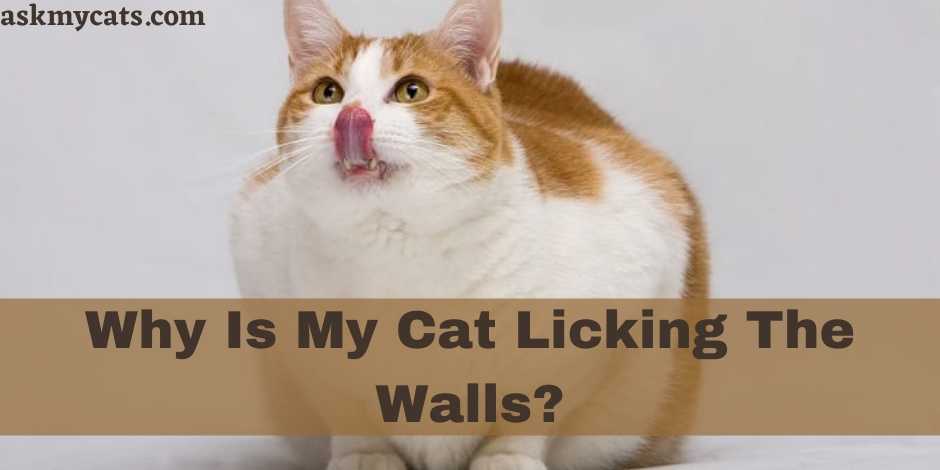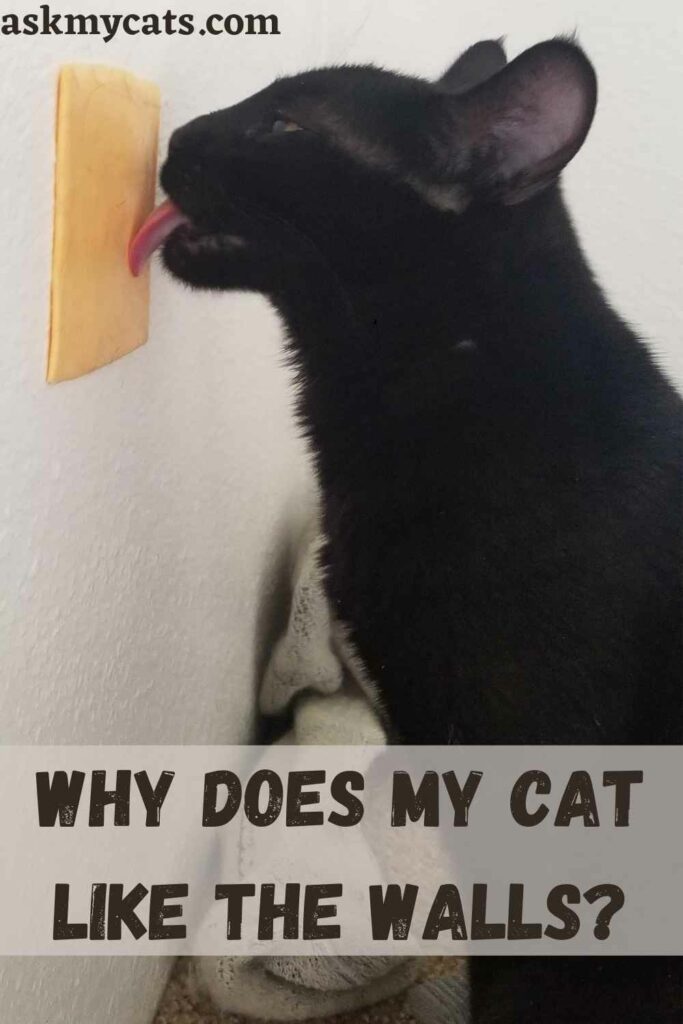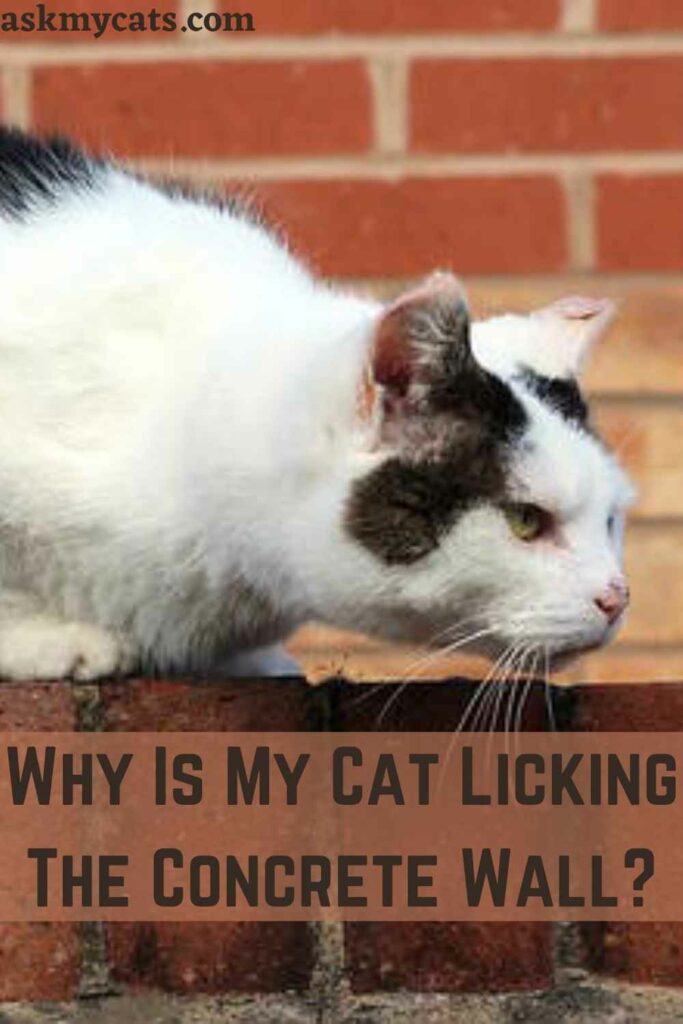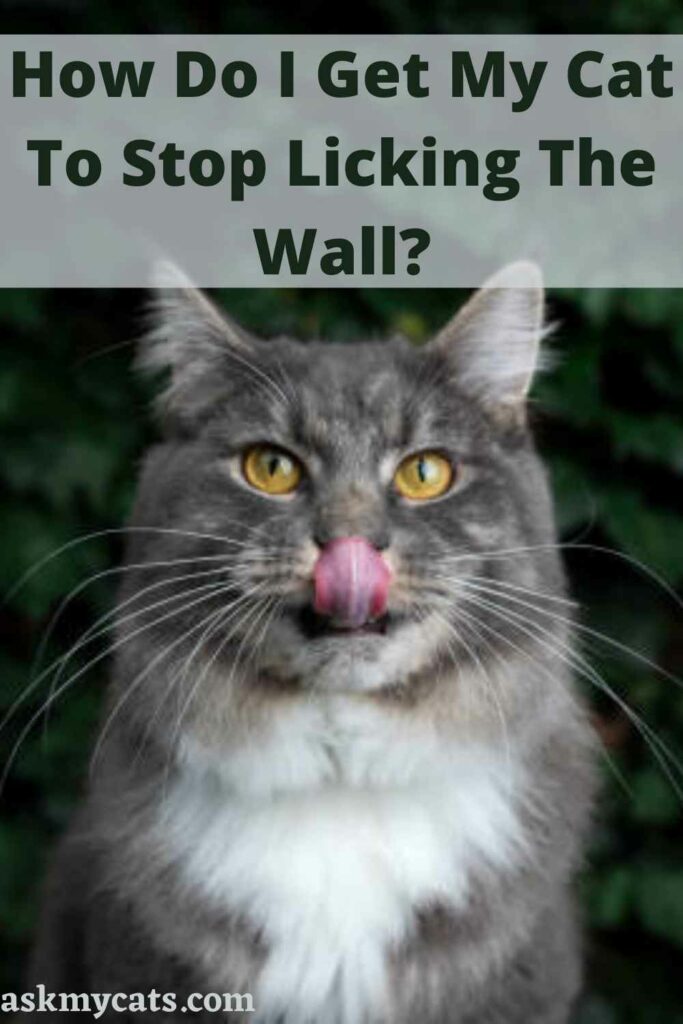Cats typically clean themselves and drink water using their tongues. You may have noticed, though, that your feline has developed a taste for licking the wall. There is no point in licking the wall from our standpoint. It has no nutritional value and can’t possibly be enjoyable.
So, is your cat licking the walls?
Your cat might be licking the wall as it could be to make up for a nutrient shortage or to get some moisture. It could also be because the surface is covered in something the cat likes to eat or smell or has a unique feel.
This article will talk about why your cat licks the wall and how you can stop it.


Give Your Cat the Perfect Day
Get the Free Ebook!
Why Does My Cat Like The Walls?
Your cat may like and lick the walls due to these reasons: –

1. Stress
Compulsive behaviors are frequently an indication of anxiety and stress.
If your cat is licking the wall and you can’t get them to stop, it’s possible that they’re stressed.
You can usually not distract your cat from their task when they have compulsive tendencies.
This means that a bag of sweets or a beloved toy won’t be enough to entice them away.
If your cat is happy to leave the wall for food or attention, it is unlikely to be compulsive.
After moving to a new home, introducing a new cat to the family, or changing the litter box placement, you may notice that your cat began licking more compulsively.
Encourage your cat to stop grooming by paying them more attention, playing with them more, or simply snuggling with them more.
Unfortunately, there isn’t much that can be done to stop compulsive behavior. If your cat is stressed, the only way to prevent them from acting out is to remove their tension.
However, because this isn’t always attainable, you may have to resort to the waiting game. Alternatively, you can seek medicine from your veterinarian to assist your cat in relaxing.
2. Boredom
It’s possible that your cat will be bored all day. This can lead to some strange behaviors, such as licking the wall. Because your cat is simply looking for something to do, this behavior is usually easy to stop.
3. Nutritional Imbalances
Pica is when your cat appears to be interested in eating and licking non-food items. Pica is a medical disease marked by a strong desire for non-food items such as walls.
We don’t know what causes pica, although some cats appear to be more susceptible than others. A dietary shortfall, such as a lack of fat, fiber, or iron, could be the cause.
The cat’s body tries to compensate for the deficit by licking things that aren’t normally considered food.
This makes sense in the wild, where the cat may take advantage of mineral reserves. In our houses, however, this is not the case.
Contact your veterinarian to address your cat’s dietary needs if they are frequently licking random objects. Check to see if your cat is eating the correct diet for her breed and size, and switch if your veterinarian recommends it.
4. Taste
Cats do not have the same taste buds as humans. As a result, they frequently locate appetizing items that we would never enjoy, such as walls. It’s possible that your paint tastes wonderful at times. Because some cats appreciate the taste and feel of walls, they are more likely to lick them.
The presence of traces of a chemical that has recently been spilled or adhered to the wall could attract your cat to lick it. Because cats are inherently curious, smelling or licking the surface is typical.
Varnishes and adhesives are also appealing to cats because they contain components that smell pleasant or are edible to them. The same may be said about plastic, whose scent and flavor may entice them.
Some volatile substances found in paint or wall coverings may be appealing to your cat because they have a hallucinogenic impact.
This is why cats occasionally bury their heads in plastic bags, licking and chewing them. The vapors from the plastic give cats a wonderful, euphoric experience.
Although modest amounts will not harm your cat, you do not want your cat to do this for an extended period of time.
Furthermore, gases such as air fresheners and cleaning products that float around the room may adhere to the walls and impart a distinct flavor.
It’s possible that this will inspire your cat to lick the wall. It’s possible that your cat is interested in licking one particular wall because it’s tasty.
5. Moisture
Moisture and condensation are frequently collected on walls. If you live in a humid environment, this is especially true. Your cat may try to lick the moisture off the wall, especially if it tastes good to them.
If they don’t have access to freshwater, cats may do the same thing, even if they don’t enjoy the taste.
6. Texture
Cats lick walls and other surfaces for the texture rather than the taste. Smooth glosses, nubby wood-chip or soft flock wallpapers, and tactile textured paint are just a few of the wall coverings that humans use in our houses that cats find fascinating.
When a cat is understimulated, it will seek out the sensations created by running its tongue over the surface.
Wallcoverings with a variety of textures are very appealing to cats. Smooth glosses, nubby wood-chip or soft flock wallpapers, and tactile textured paint are just a few examples.
Cats who are understimulated may seek sensations by sticking their tongues against the wall’s surface. Check if your pet licks other surfaces with a similar texture to see if it’s the texture that’s causing it to lick the wall.
Of course, you can’t simply ask a cat, “Do you lick walls because you like the texture?” but you may hunt for signs that this is the motivation behind the habit.
The cat licking other surfaces with a similar texture is a strong clue that it’s a tactile issue. A cat that licks flock wallpaper and also licks suede or velvet clothing is most likely doing so because she enjoys the sensation.
Why Is My Cat Licking The Concrete Wall?
Your cat may be licking the concrete wall as she could be suffering from pica resulting from anemia, a lack of calcium, or other nutritional deficiencies. In other cases, cats may just lick the concrete because they like the texture, temperature, or even the taste of the concrete.

Feline pica is a complex disorder in which cats are compelled to consume or lick non-food items for a variety of reasons, some of which are unclear.
Pica is frequently caused by an underlying problem, such as anemia or dietary deficits.
To put it another way, a concrete licking cat could be suffering from pica as a result of anemia or another problem.
However, not every instance of a cat licking anything unusual is due to pica.
Licking concrete or cement isn’t always indicative of a medical condition, and some cats may just love the texture or temperature of concrete.
Cats don’t need a good cause to lick anything every now and then; they may simply enjoy the smooth or rough feel.
Alternatively, they may enjoy the way concrete seems to retain extra heat or coldness, depending on the weather.
In any case, there’s something for every cat, as strange as it may sound because there’s so much difference in the texture and sorts of concrete and cement.
The cat could be eating little insects that live on the surface rather than licking the concrete. Clover mites, spider mites, and other small insects can be found in abundance on concrete surfaces, and cats appear to like eating them.
How Do I Get My Cat To Stop Licking The Wall?
You can get your cat to stop licking the wall by following these steps: –

1. Stress Reduction
When cats are stressed, they often display unusual habits such as licking walls.
These may aid the cat’s survival in the wild. However, they are rarely beneficial in our households.
You can help your pet feel less stressed in a variety of ways.
You may be able to directly eliminate the source of your pet’s stress in some cases.
Perhaps you can provide them with a safe haven from the new dog. Alternatively, you may create a hiding place for your cat when your guests come around.
We frequently have no direct influence over the source of our cat’s worry.
Maybe they’re just not fond of the new kitten. Alternatively, they could be stressed by a change in routine. You’ll have to get inventive with your cat’s stress relief in these situations.
You can use pheromones to help your cat feel less stressed. They make pheromone collars and pheromone dispensers that plug into outlets, for example.
These can help your cat feel less stressed. Of course, some drugs and nutrients can help cats feel less anxious.
2. Book An Appointment
A variety of underlying diseases can cause pica, or it can be caused by nothing at all. Pica, including all of its causes, is something we don’t fully comprehend yet.
Pica, on the other hand, can be caused by a medical problem. Pica is most commonly caused by hyperthyroidism, anemia, leukemia, dental problems, and diabetes. Other underlying conditions, on the other hand, could be to blame.
Most of these ailments will require a visit to your veterinarian to be ruled out. Cats are usually excellent at concealing their illness. As a result, you may not notice many indicators that your cat is ill.
3. Change In Diet
Licking walls can also be caused by dietary issues. In these circumstances, you’ll need to adjust your cat’s food to one that fulfills its nutritional requirements better.
We recommend speaking with your veterinarian, particularly if your cat has a medical condition that may influence their nutritional requirements.
Lower-quality diets may lack the nourishment that your feline requires. When at all feasible, choose high-quality meals.
4. Keep Them Hydrated
Freshwater should always be available to your cat, and he should be encouraged to drink it. You should use wet cat food instead of dry cat food if your cat has an underlying condition that requires them to drink more water.
If your cat refuses to drink from a water bowl, you might want to explore using a cat fountain.
Many cats, as a result of their evolutionary history, will not drink from stagnant water. Instead, kitties require fresh, flowing water, which a cat fountain can provide.
Frequently Asked Questions
Will toys help in stopping my cat licking walls?
Cats will frequently lick walls merely because they are bored. If your cat is bored, you should buy them some exciting toys to keep them occupied. Puzzle toys are a good option for intelligent cats. They make some that are quite easy and some that are very difficult. You can use these toys to keep your cat occupied while you’re out during the day.
Why does my cat lick smooth surfaces?
Dehydration and moisture. Dehydration may be the cause of your cat’s licking of smooth or chilly surfaces. Your cat could be licking a concrete or tiled surface to get at the moisture that has formed on it.
Is pica bad for cats?
Pica is a condition in which a cat sucks or licks inedible objects but does not swallow them. Pica, on the other hand, can cause intestinal blockage, ripping of the digestive tract, poisoning, and electrocution if the feline consumes the thing completely.
Final Words
It’s possible that your cat is licking the wall because of the flavor, smell, or texture. On the other hand, some cats will lick the wall if they are bored, anxious, or have a health problem. It’s better to take the cat to the veterinarian to rule out any underlying medical issues. Offering an alternative activity to discourage the habit will aid in its correction.
If you have any unanswered questions, feel free to ask us in the comments section.
